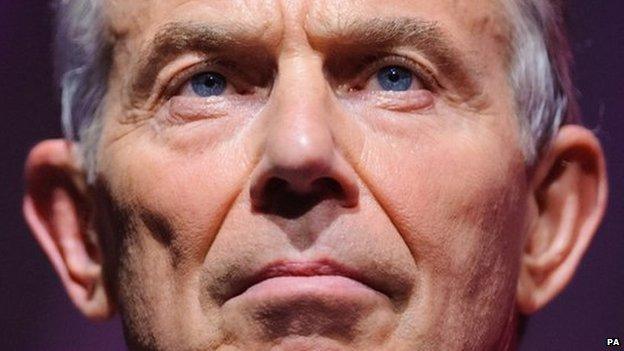Tony Blair: What about his arguments?
- Published

Well, people have certainly got off their chest how they feel about Tony Blair.
Those who always opposed the war in Iraq have united to cry "we told you so" and "shut up". Those who once supported it and him - like John Prescott - now say that Blair is a crusader hell-bent on another war.
This morning Boris Johnson somehow managed to make news simply by calling the former prime minister mad.
What has yet to happen - though maybe it will in the Commons this afternoon - is an examination of Blair's arguments in his 2,800 word essay and extended TV interviews. This, in summary, is his case:
1. What is happening in Iraq and Syria poses a threat to us here at home too. The new extremists in Iraq - ISIS - include many home-grown radicals who will return here once they've finished in the Middle East.
2. Military intervention does not always make things worse - after all, look at Syria. There has been no Western intervention - though plenty from Russia and the region - and the civil war has been as bloody and as disastrous as anything seen in Iraq
3. There is a range of options which doesn't involve "boots on the ground" or doing nothing. Air strikes altered the balance of power in Libya and Kosovo.
This morning the foreign secretary refused to rule out any intervention in any circumstance although William Hague made it clear that the UK was not considering military action in Iraq and the US "is more likely to have the assets and capabilities" needed.
Intervention, he argued, should only be used as a last resort, with limited objectives, and when it was accompanied by an agreed regional plan for the future.
He went on to argue that what was happening in the region should not be seen solely through the prism of whether the West should or should not intervene.
He did not say whether - in this case - he believed the United States would be making things better or worse.
Labour has quietly backed the government's stance fearful, no doubt, of re-contamination by the bitter divisions that Tony Blair still inspires.
One columnist - the Daily Telegraph's Benedict Brogan - asked an intriguing and provocative question about Tony Blair this morning, external - he may be mad but is he right?
Update:
Labour's shadow foreign secretary Douglas Alexander has carefully walked the tightrope in the party's first reaction to Tony Blair's comments on Iraq. Speaking in the Commons, he said:
"Inevitably and understandably these events have rekindled the debate around the military intervention in Iraq 11 years ago.
"For most British people, including many of us who supported the action at the time, the fears of those opposed to the intervention have been vindicated by subsequent events. It is futile to deny that subsequent history as surely as it would be folly to repeat it.
"Yet it is also facile to suggest that the crisis affecting Iraq today can be attributed solely to the consequences of intervention. Such an account denies the truth that the slide towards crisis in Iraq has been exacerbated by the civil war in Syria.
"These today are two nations both sitting astride the Sunni-Shiite fault line engulfed increasingly by sectarian violence whilst the rest of the region has looked on as sectarian tensions rise. Tragically for Iraq, the hallmark of Nouri al-Maliki's Shia dominated government has been sectarian rather than an inclusive approach."